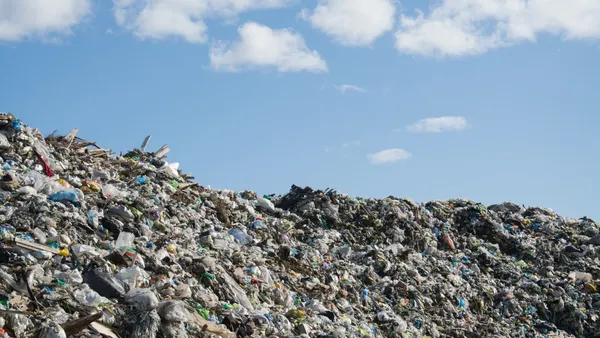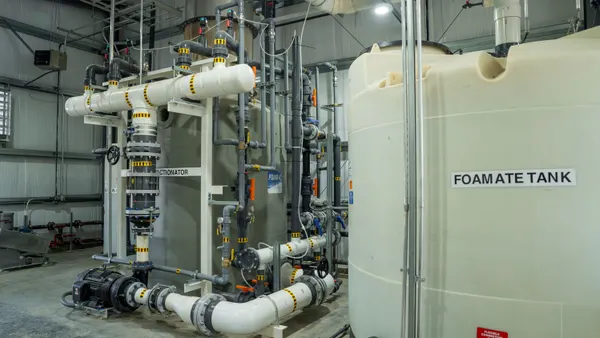Dive Brief:
- Waste and composting industry groups say they will continue to seek a narrow exemption from certain PFAS liability under Superfund now that the U.S. EPA has listed two PFAS as hazardous substances.
- The EPA, which announced the designation last week, says it does not intend to pursue municipal landfills or water utilities in its enforcement strategy. Yet industry groups like the National Waste & Recycling Association, the Solid Waste Association of North America and the US Composting Council says that’s not enough to protect them from liability.
- The groups say they’ll seek more permanent liability protections by supporting a federal bill meant to codify the exemption while also building support in Congress and within the Biden administration.
Dive Insight:
The waste industry has long said the hazardous substance designation could create conditions under which landfill operators and others could face lawsuits or high cleanup costs for receiving or handling PFAS-containing items. Industry groups say they are “passive receivers,” meaning they do not generate PFAS or have control over PFAS-laden materials that enter their facilities.
PFAS can be found in materials such as food packaging, textiles and cookware, and research has shown that many landfills have some level of PFAS contamination.
The EPA says perfluorooctanoic acid (PFOA) and perfluorooctanesulfonic acid (PFOS) are “widely used” PFAS linked to health issues such as cancer and immune and developmental disorders. The agency also recently set drinking water standards for some of the chemicals. Some waste companies also see the rise of such regulations as a business opportunity to offer destruction or disposal services.
The EPA is targeting such chemicals under the Comprehensive Environmental Response, Compensation and Liability Act, known as CERCLA or Superfund. It says the hazardous substance designation is meant to help the agency more quickly go after those who have “significantly contributed to the release of PFAS into the environment,” such as PFAS manufacturers or certain government agencies.
In a policy memo, David Uhlmann, the EPA’s assistant administrator for enforcement and compliance assurance, said it doesn’t plan to go after “publicly owned/operated municipal solid waste landfills,” or water utilities, farms “where biosolids are applied to the land,” publicly owned treatment works, certain airports, local fire departments and several other entities. Targeting major PFAS polluters is also among the EPA’s National Enforcement and Compliance Initiatives for the 2024-2027 period.
In a statement, NWRA said it supports the EPA’s motivations for “protecting human health and the environment and in accelerating remediation activities,” but said a policy memo isn’t enough to alleviate concerns “about the potential impact of the rule in holding landfills and other essential public services accountable for recovery actions.”
Amy Lestition Burke, CEO of SWANA, said the policy memo doesn’t protect certain types of waste facilities, such as privately owned landfills that accept municipal solid waste. That “causes concerns for potential liability, cost burdens on ratepayers, and the risk of certain waste streams having nowhere to go,” she said in a statement. “EPA’s decision not to pursue a passive receiver does not protect the passive receiver from a lawsuit from other potentially liable parties.”
Compost was also not mentioned in the policy memo, which the US Composting Council sees as an oversight considering the organization has worked to exempt the practice from Superfund liability alongside the waste industry.
Frank Franciosi, USCC’s executive director, said in a statement that the organization will now focus on supporting federal legislation “to be sure composters are exempted as passive receivers.”
The waste industry has taken this issue to Congress in the past, including during a Senate hearing in March, and many see federal intervention as the clearest path forward. The groups, as well as companies such as WM, support the Resource Management PFAS Liability Protection Act, a federal bill that aims to shield such industries from liability by formalizing such an exemption for landfill operators and other entities. Sen. Cynthia Lummis, R-Wyo., introduced the bill in May 2023. It has not advanced.
On X, formerly known as Twitter, Lummis criticized the EPA’s hazardous substance designation, saying the agency “continues to offset this burden on innocent people rather than holding those causing the pollution responsible.”
Other Senators who support the waste industry’s liability exemption efforts include Sen. Shelley Moore Capito, R-W.Va., ranking member of the Environment and Public Works Committee. Capito has long criticized the EPA for putting “local communities and ratepayers on the hook for PFAS contamination they had nothing to do with in the first place.”
Yet some environmental groups have said CERCLA is not designed to include such formal exemptions, stating that this could create loopholes for the major polluters the EPA says it wants to hold responsible. The Environmental Working Group has long spoken against any industry exemptions.
The Association of State and Territorial Solid Waste Management Officials said in a statement that they were “pleased” with the designation and the group is “dedicated to working with our stakeholders and federal partners to better understand and address PFOA and PFOS contamination.” The association called for state waste management groups and the EPA to work closely together on enforcement matters and requested federal financial assistance to support state cleanup programs.
Senator Tom Carper, D-Del., chair of the EPW Committee, applauded the hazardous substance designation as a “first step toward holding the actual polluters accountable.” He called for more “strategic national policies and investments to help us stop the spread of PFAS contamination.”











